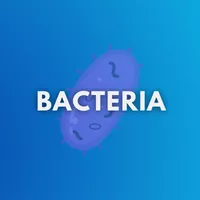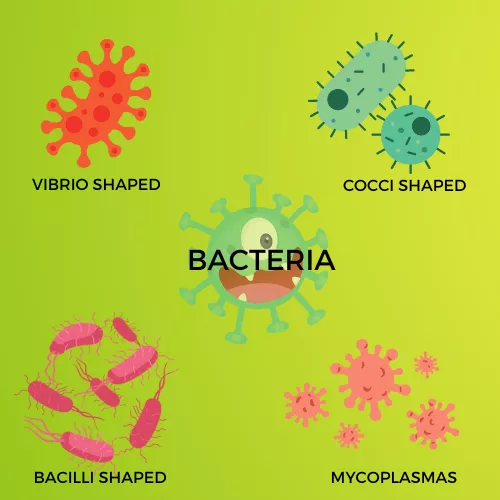Key difference: Both these words come under the same organisms and have the same characteristics, which are nothing but, Bacteria and Germs. Both of these microorganisms will help in improving ecosystems and are harmful too. Bacteria is a specific microorganism found in various environments such as soil, water, etc. In contrast, germs contain a broad range of microorganisms such as Bacteria, Algae, Protozoa, Parasites, fungi, and viruses. Bacteria is the smallest living organism on this planet. While all Bacteria are germs, not all germs are bacteria. In this article, you can know the significant differences between bacteria and germs.
Good Examples of the words “Bacteria and Germs” are,
1. Bacteria do not have a nucleus.
2. Chlorine is mostly used to kill germs.
BACTERIA

Bacteria are prokaryotic organisms.
Bacteria are microscopic, single-celled organisms with no nucleus and no organelles. Some bacteria are harmful and produce toxins; harmful chemicals affect them, and some are harmless. It is a prokaryotic and single cell’s organism. Humans have long used bacteria to create food products such as cheese, yoghurt, and pickles. Most of the bacteria are fast-growing and are first called animalcules.
There are two types of bacteria, one is Gram-positive, and the other one is Gram-negative. The major difference in both types is gram-negative bacteria have an outer membrane in their body. The world’s first bacteria are cyanobacteria. Bacteria is the smallest living organism on this planet. The main characteristic of bacteria is it doesn’t have membrane-bound organelles in its body. The Best Example of Bacteria is “Bacteria lives in pH neutral.”
How do We Spell the Word Bacteria?
The vocal representation of the word Bacteria is “bak·teeuh·ree·uh,“ and in the below, you can know by hearing the audio of the phrase bacteria.
Enunciation:
Syllabification is where we split the words into individual vowel sounds. A syllable should have at least one vowel in the word. For example, we will see the syllable of the word “Bacteria.”
- I wondered if the word “Bacteria” has four syllables.
- The split is “BAC-TE-RI-A.”
Using “Bacteria” in sentences:
- Bacteria are disease-causing microorganisms.
- We need to wash our hands using soap to kill bacteria.
- Leeuwenhoek is the father of bacteria.
- How are the bacteria spreading?
- The size of the bacteria is 0.4–3 µm3.
GERMS

Germs are a small masses of the living substances.
Germs are living organisms that are found everywhere on this planet. Some germs are harmful some are beneficial. Germs enter our body through the host via mouth, hand, nose, urogenital openings, or through wounds and bites in the skin of our body. These tiny organisms are invisible to the eyes, and we can’t see with our naked eye. We can avoid germ disease through regular cleanliness and hygienic practices, and after affecting germs, we can take antibiotics to cure the diseases.
The Best Example of germs is “Pathogens are the harmful germs.”
How do We Spell the Word Germs?
Spell / Pronunciation in which a word or particular language is spoken among people. The Oral representation of the phrase germs is “juhmz.” It would help if you practiced it slowly for the outcome of a perfect spell. Below, you can know by hearing the audio of the word germs.
Enunciation:
Syllabification is where we split the words into individual vowel sounds. A syllable should have at least one vowel in the word. For example, we will see the syllable of the word “Germs.”
- Wondering if the word “Germs” has one syllable in it.
- The split is “GERMS.”
Using “Germs” in sentences:
- Due to dirtiness, germs occur on the floor.
- Bacteria and Viruses are examples of germs.
- Salmonella and E.coli are examples of bacterial germs.
- Germs cause sickness in humans.
- Some germs are beneficial called probiotics.
Similarities between Bacteria & Germs
The title reveals the difference between Bacteria & Germs. But, like, you want to know also similar things about the above two words. So come, let’s see below.
- Both Bacteria and Germs are very small living microorganisms that you can see under the only microscope, and both can cause diseases.
- Bacteria and Germs spread in contact from one person to another person, through contaminated surfaces, and by fluids, and both can be treated with antibiotics.
Compare: BACTERIA & GERMS
| BACTERIA | GERMS | |
|---|---|---|
| DEFINITION | It is the large group of microorganisms which is a unicellular one. | It is a very small group of microorganisms that causes diseases and is sometimes beneficial too. |
| SYNONYMS | Microorganisms, Bacilli, Bugs, Pathogens. | Microbes, Pathogens, Microorganisms, Parasites, Bugs, Contaminants, Infection-causing agents. |
| TYPES | Coccus form – Spherical-shaped Bacillus form – Rod-shaped Spirilla form – Spiral-shaped Vibrio form – Comma-shaped | Bacteria Viruses Algae Protozoa Parasites Fungi |
| BENEFICIAL | Some bacteria are useful. | All causes and some types of germs are harmful. |
| REPRODUCTION | Bacteria reproduce through binary fission. | Most germs are self reproduction, some need a host for reproduction. |
| EXAMPLES | Bacteria are microscopic organisms. Bacteria eat starches and sugars. E. coli is the main type of bacteria in food. The other name of bacteria is animalcules. Bacteria have flagellum to move its body. | Many germs live in our human bodies. You can find germs in the air too. Germ layers form due to the process of gastrulation. Infectious diseases are caused mostly by germs. Germs will attack both veterinary and human beings. Germ is a word derived from the Latin word german |
Infographic Representation:


Resources & References:
Resources: Cambridge Dictionary (Bacteria & Germs), Merriam-Webster (Bacteria & Germs), Dictionary.com (Bacteria & Germs)
Reference: Dictionary.Cambridge.org[1], Merriam-Webster. com[2][3], Dictionary. com[4].
